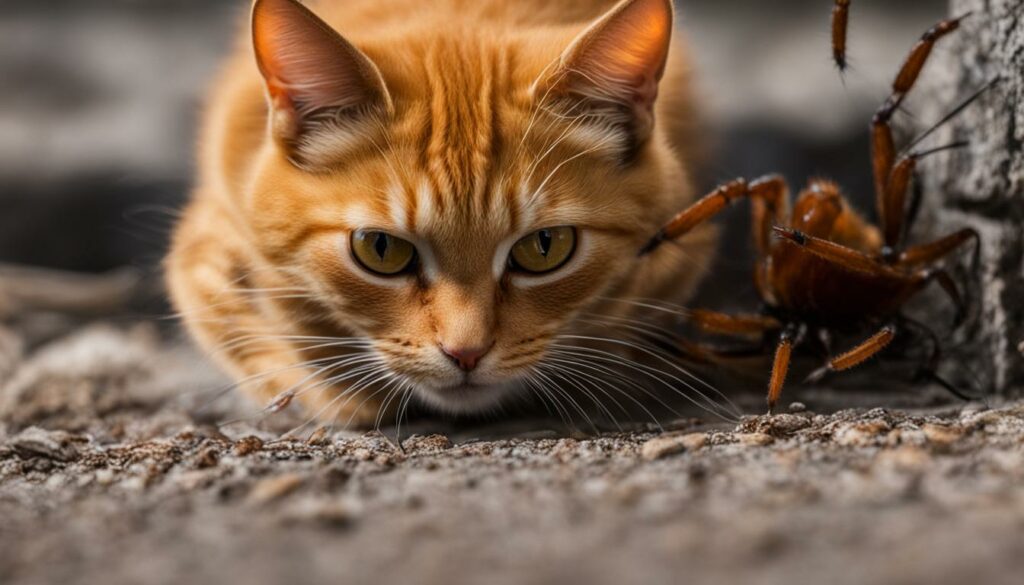Cats are curious creatures, often exploring their surroundings and occasionally coming across spiders. While most spiders are harmless to cats, there are venomous species, such as the brown recluse, that can pose a danger if ingested. It is essential to understand the effects of brown recluse spider venom on cats and the potential symptoms of a spider bite. Additionally, knowing how to prevent cats from eating brown recluse spiders and the treatment options available can help keep your feline friend safe and healthy.
Immediate veterinary attention is crucial if you suspect your cat has consumed a venomous spider. Symptoms to watch out for include loss of appetite, lethargy, fever, drooling, or swelling around the mouth or throat. Prompt action can greatly increase the chances of a positive outcome for your cat.
Key Takeaways:
- Not all spiders are harmful to cats, but venomous species like the brown recluse can cause illness if ingested.
- Symptoms of a spider bite in cats may include loss of appetite, lethargy, fever, drooling, or swelling around the mouth or throat.
- Immediate veterinary attention is crucial if you suspect your cat has eaten a venomous spider.
- Preventing cats from eating brown recluse spiders involves creating a safe environment, removing spider hiding spots, and providing mental stimulation for your cat.
- Treatment options for cats who eat brown recluse spiders may include supportive care, pain relief, and other necessary medications.
Are Spiders Harmful to Cats?
When it comes to the question of whether spiders are harmful to cats, the answer is not a simple one. While many spiders are harmless and pose no threat to feline companions, there are certain species that can be dangerous if a cat is bitten. It’s important for cat owners to be aware of the potential risks associated with spiders to ensure the well-being of their furry friends.
The dangers of spiders to cats lie primarily in the venom that some species possess. While most spider bites only cause mild gastrointestinal upset in cats, certain venomous spiders such as the black widow or brown recluse can cause more severe illness. Bites from these venomous spiders can result in symptoms such as pain, paralysis, dermonecrotic wounds, or systemic toxicity in cats.
It’s crucial for cat owners to be vigilant and take steps to minimize the risks of spider bites. Creating a safe environment for cats by removing spider hiding spots, keeping the yard clean, and using glue traps can help reduce the chances of exposure. Engaging cats in regular exercise and providing interactive toys can also redirect their hunting instincts towards safer outlets. However, if a cat exhibits symptoms of a spider bite or has been bitten by a venomous spider, immediate veterinary attention should be sought to ensure proper diagnosis and treatment.
Table: Spider Species and Their Potential Effects on Cats
| Spider Species | Potential Effects on Cats |
|---|---|
| Black Widow | Pain, paralysis, systemic toxicity |
| Brown Recluse | Pain, dermonecrotic wounds, systemic toxicity |
| Non-Venomous Spiders | Mild gastrointestinal upset |
“While most spiders are harmless to cats, it’s important for cat owners to be aware of the potential risks associated with spiders and take steps to minimize the chances of their feline companions being bitten by venomous species.”
By understanding the potential dangers of spiders to cats and taking necessary precautions, cat owners can help ensure the safety and well-being of their beloved pets.
What Happens If My Cat Eats a Spider?
As a cat owner, you may wonder what happens if your feline friend decides to indulge in a spider feast. In most cases, eating a spider will not cause harm to your cat. Spiders are not a necessary part of a cat’s diet, and they should be receiving balanced nutrition from their commercial cat food. However, if your cat frequently consumes spiders or exhibits obsessive behavior towards them, it may indicate boredom or nutritional deficiencies that should be addressed.
But what if the spider your cat eats is venomous? In such cases, there is a risk of illness or poisoning that requires immediate veterinary attention. While most spiders are harmless, some species possess venom that can cause adverse effects in cats if ingested. It’s important to be aware of the potential consequences and seek professional help if needed.
In order to prevent your cat from eating spiders altogether, creating a safe and stimulating environment is key. Ensure that your home is free from spider hiding spots, such as clutter or debris. Regularly clean your yard to minimize the presence of spiders. Providing your cat with interactive toys and engaging them in regular exercise can also help redirect their hunting instincts towards safer outlets and reduce their interest in consuming spiders.
| Consequences of Cats Eating Spiders |
|---|
| Consequence: Risk of illness or poisoning |
| Solution: Seek immediate veterinary attention if your cat consumes a venomous spider. |
| Consequence: Boredom or nutritional deficiencies |
| Solution: Address any underlying issues that may lead to excessive spider consumption. |
Remember, preventive measures and regular check-ups with your veterinarian are essential to keep your beloved feline friend safe and healthy.
Symptoms of Spider Bites in Cats
Spider bites in cats can cause a range of symptoms depending on the species of spider and the severity of the bite. It’s important to be aware of these symptoms so you can seek veterinary care for your cat if necessary. The following are common signs of spider bites in cats:
- Localized pain, swelling, redness, and itchiness at the bite site
- Loss of appetite and lethargy
- Fever
- Drooling
- Swelling around the mouth or throat
In more severe cases, venomous spider bites can lead to systemic reactions in cats, including vomiting, elevated heart rate, trouble breathing, kidney failure, clotting abnormalities, and even coma. If you notice any of these symptoms in your cat, it is important to seek immediate veterinary attention.
Remember, the symptoms of spider bites can vary, and it’s always best to consult with your veterinarian for an accurate diagnosis and appropriate treatment.
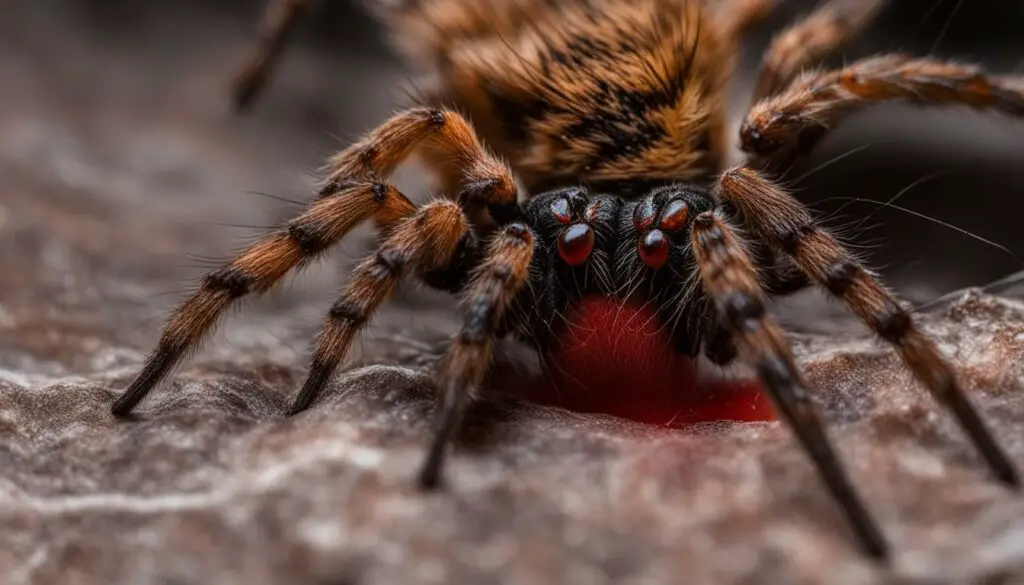
When to Seek Veterinary Care
If you suspect that your cat has been bitten by a spider, it’s important to monitor their symptoms closely. While mild symptoms may resolve on their own, severe reactions can be life-threatening. Here are some situations when you should seek veterinary care:
- If your cat shows signs of a venomous spider bite, such as severe pain, paralysis, or dermonecrotic wounds.
- If your cat exhibits systemic symptoms such as vomiting, elevated heart rate, or difficulty breathing.
- If the bite site becomes increasingly swollen, red, or shows signs of infection.
- If your cat’s condition worsens or does not improve within 24 hours.
Remember, early intervention and proper treatment can greatly improve your cat’s chances of a full recovery from a spider bite.
Treatment Options for Spider Bites in Cats
When it comes to spider bites in cats, prompt veterinary care is crucial to ensure the best possible outcome. The treatment options for spider bites will vary depending on the severity of the symptoms and the type of spider responsible for the bite.
If your cat has been bitten by a spider, your veterinarian may provide supportive care to manage the symptoms. This can include pain relief medication, anti-inflammatories to reduce swelling, and fluid therapy to maintain hydration. In cases where necrotic skin lesions are present, surgical intervention may be necessary to remove damaged tissue and promote healing.
It’s important to note that antivenom for spider bites in cats may not be readily available or necessary in all cases. Your veterinarian will assess the specific situation and determine the most appropriate course of treatment to ensure your cat’s well-being.
| Treatment Options for Spider Bites in Cats |
|---|
| Supportive care |
| Pain relief medication |
| Anti-inflammatories |
| Fluid therapy |
| Surgical intervention (for necrotic skin lesions) |
| Antivenom (if necessary and available) |
If you suspect that your cat has been bitten by a spider, it’s important to seek veterinary care as soon as possible. Your veterinarian will be able to provide a proper diagnosis and recommend the appropriate treatment options based on your cat’s individual needs.
Prevention Tips to Keep Cats Safe from Spiders
As a responsible cat owner, it’s important to take proactive measures to keep your feline companion safe from spiders and prevent the risk of spider bites. Here are some helpful prevention tips:
- Keep your home and yard clean and clutter-free: Regularly clean and declutter your living spaces to eliminate potential hiding spots for spiders. Pay special attention to areas like basements, attics, and storage spaces.
- Seal up cracks and crevices: Spiders can enter your home through small gaps and openings. Seal up any cracks or crevices in doors, windows, and walls to prevent spiders from finding their way inside.
- Use natural spider repellents: Certain scents like peppermint, vinegar, and citrus are known to repel spiders. You can create DIY repellents using these ingredients or purchase natural spider repellent products.
- Keep your cat entertained: Boredom can lead to excessive hunting behavior in cats. Provide your cat with plenty of interactive toys, scratching posts, and playtime to keep them mentally stimulated and focused on safer activities.
- Regularly check your cat’s outdoor environment: If your cat spends time outdoors, inspect the area for spider webs and remove them. Be cautious when handling spiders or webs to avoid bites or stings.
By following these prevention tips, you can significantly reduce the risk of your cat encountering spiders and prevent spider bites. If you live in an area known for venomous spiders, consult with your veterinarian for additional advice on keeping your cat safe.

Table: Common Spider Species and Their Potential Effects on Cats
| Spider Species | Potential Effects on Cats |
|---|---|
| Common House Spider | Harmless unless allergic reaction occurs |
| Black Widow Spider | Potential for severe illness or systemic toxicity |
| Brown Recluse Spider | Potential for necrotic skin lesions and localized tissue damage |
| Jumping Spider | Harmless and non-venomous |
Note: This table provides a general overview and may not include all spider species. If you suspect your cat has been bitten by a spider, consult with your veterinarian for proper diagnosis and treatment.
Remember that prevention is key when it comes to keeping your cat safe from spiders. By being proactive and providing a safe environment, you can minimize the risk of spider bites and ensure the well-being of your feline companion.
Understanding Brown Recluse Spider Bites in Cats
When it comes to spider bites, brown recluse spider bites are a cause for concern in cats. These bites can result in necrotic lesions if left untreated, making it vital to identify and address them promptly. Brown recluse spider bites may not be painful at first, but the venom from these spiders can cause local inflammation and tissue damage.
Typically, brown recluse spider bites manifest as small red bumps, but in severe cases, they can lead to the formation of a “bull’s-eye” lesion with a dry, black scab. As the bite heals, ulcers and localized tissue damage may occur. In rare instances, cats can experience systemic reactions.
Diagnosing brown recluse spider bites in cats can be challenging, as they can mimic other conditions that cause necrotic sores. However, a veterinarian will consider the cat’s medical history, symptoms, and geographical location to help make an accurate diagnosis. Seeking veterinary care is crucial if you suspect a brown recluse spider bite in your cat.
| Symptoms of Brown Recluse Spider Bite in Cats |
|---|
| Painless bite initially |
| Local inflammation and tissue damage |
| Small red bump or “bull’s-eye” lesion |
| Ulcers and localized tissue damage |
| Possible systemic reactions (rare) |
When it comes to treatment, supportive care is key for brown recluse spider bites in cats. This may involve pain management, the use of antibiotics to prevent secondary infections, and close monitoring of the wound for healing or necrosis. Severe cases may require additional interventions such as intravenous fluids, antihistamines for itchiness, and other medications to address systemic signs. The recovery process can vary in duration, and proper wound care is essential for healing.
Prevention is always better than cure. To reduce the risk of brown recluse spider bites in cats, it’s important to create an environment that minimizes spider hiding spots. Regular cleaning, decluttering, and swift action against spider infestations can help keep cats safe. By staying vigilant and monitoring your cat’s behavior and environment, you can minimize their exposure to brown recluse spiders and mitigate the potential risks.
How to Identify a Brown Recluse Spider
Identifying a brown recluse spider is crucial for understanding the potential risks it poses to both humans and cats. By being able to distinguish a brown recluse spider from other harmless species, you can take appropriate measures to minimize the chances of encounters and bites. Here are the key characteristics to look for when identifying a brown recluse spider:
- Color: Brown recluse spiders range in color from tan to dark brown.
- Markings: One of the most distinctive features of a brown recluse spider is the dark, violin-shaped mark on its back, which is why they are often referred to as violin spiders.
- Eye Pattern: Unlike most spiders that have eight eyes, brown recluse spiders have only six eyes arranged in a semicircular pattern.
It’s important to note that identifying a brown recluse spider can be challenging, as their appearance may vary. If you suspect a brown recluse spider in your vicinity, it is recommended that you exercise caution and seek professional assistance for proper identification.
“One of the most distinctive features of a brown recluse spider is the dark, violin-shaped mark on its back, which is why they are often referred to as violin spiders.”
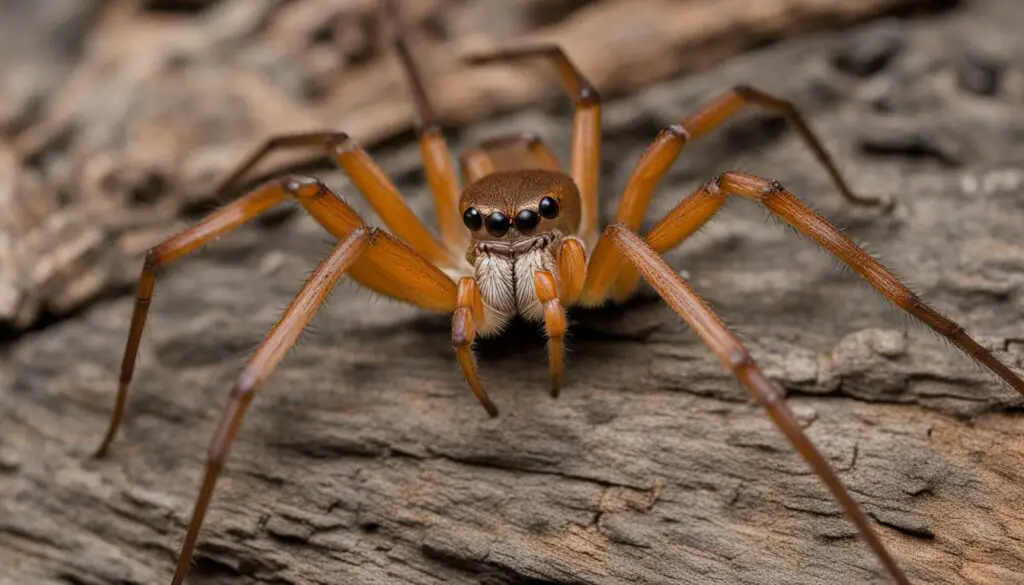
The Importance of Proper Identification
Properly identifying a brown recluse spider is crucial for taking appropriate action to prevent bites and minimize the risk to both humans and pets. Understanding their distinctive markings and eye pattern can help you differentiate them from other harmless spiders, allowing you to take necessary precautions and seek professional help if necessary.
Diagnosing Brown Recluse Spider Bites in Cats
When it comes to diagnosing brown recluse spider bites in cats, several factors come into play. The process begins with a thorough medical history review, taking note of any potential exposure to spiders or unusual behavior exhibited by the cat. The next step is a physical examination, which includes inspecting the bite site for any signs of necrotic tissue or inflammation. Additionally, bloodwork may be conducted to rule out other potential causes of the cat’s symptoms.
To aid in the diagnosis, if it is possible to safely collect the suspected spider, it can be helpful for identification purposes. However, it’s crucial to exercise caution and prevent any potential bites when attempting to capture the spider. The veterinarian will consider the cat’s symptoms, medical history, and the geographical location to make an accurate diagnosis. It’s important to note that diagnosing a brown recluse spider bite can be challenging, as it can mimic symptoms of other conditions that cause necrotic sores.
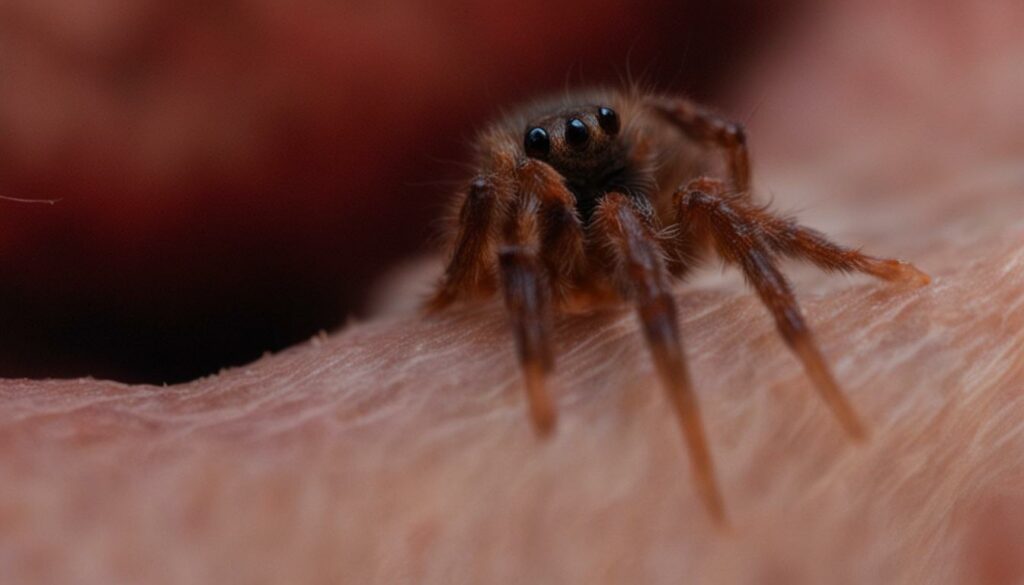
Remember, if you suspect a brown recluse spider bite in your cat, it is essential to seek veterinary care promptly. A professional diagnosis and appropriate treatment can help prevent complications and ensure the best possible outcome for your feline companion.
Treatment and Recovery for Brown Recluse Spider Bites in Cats
When it comes to the treatment and recovery of brown recluse spider bites in cats, prompt veterinary care is essential. The severity of the bite and its associated symptoms will determine the course of treatment. Veterinarians typically focus on providing supportive care to manage pain and prevent secondary infection. Antibiotics may be prescribed to address any potential infections that may arise. It is crucial to monitor the wound closely for signs of healing or necrosis.
In more severe cases, intravenous fluids may be administered to ensure hydration and support the cat’s overall well-being. Antihistamines may also be prescribed to alleviate itchiness and discomfort. The recovery process can be lengthy, often taking weeks to months for full healing to occur. Throughout the recovery period, it is important to follow the veterinarian’s instructions for wound care and monitor the cat’s progress closely.
While each cat’s response to a brown recluse spider bite can vary, with proper treatment and care, most cats can achieve a full recovery. It is crucial to remain vigilant and proactive in seeking veterinary attention if you suspect your cat has been bitten by a brown recluse spider. Early intervention and comprehensive treatment can greatly improve the cat’s chances of a successful recovery.
| Treatment for Brown Recluse Spider Bites in Cats | Recovery from Brown Recluse Spider Bites in Cats | Managing Brown Recluse Spider Bites in Cats |
|---|---|---|
| Provide supportive care to manage pain | Monitor the wound for signs of healing or necrosis | Seek prompt veterinary care for suspected bites |
| Prescribe antibiotics to prevent secondary infection | Administer intravenous fluids for hydration and support | Follow veterinarian’s instructions for wound care |
| Monitor for potential complications | Prescribe antihistamines for itchiness and discomfort | Stay vigilant and proactive in monitoring the cat’s progress |
| Adjust treatment based on the severity of symptoms | Ensure proper nutrition and a stress-free environment | Provide a safe and spider-free living environment |
Preventing Brown Recluse Spider Bites in Cats
When it comes to keeping our beloved feline friends safe, preventing brown recluse spider bites is essential. These venomous spiders can pose a risk to our cats’ health if they come into contact with them. By taking a few preventive measures, we can greatly reduce the chances of our cats being bitten by these dangerous spiders.
One effective way to prevent brown recluse spider bites in cats is to create a spider-free environment. This can be achieved by keeping your home and yard clean and clutter-free. Regularly clean and vacuum areas where spiders may hide, such as storage spaces, closets, and under furniture. Seal any cracks or gaps in walls or windows to prevent spiders from entering your home.
Additionally, it’s important to be mindful of your cat’s outdoor environment. Keep your yard well-maintained and remove any debris or woodpiles where spiders may reside. Regularly check your cat’s outdoor resting areas, such as sheds or outdoor furniture, for signs of spider activity. By minimizing potential spider habitats, you can greatly reduce the risk of spider bites.
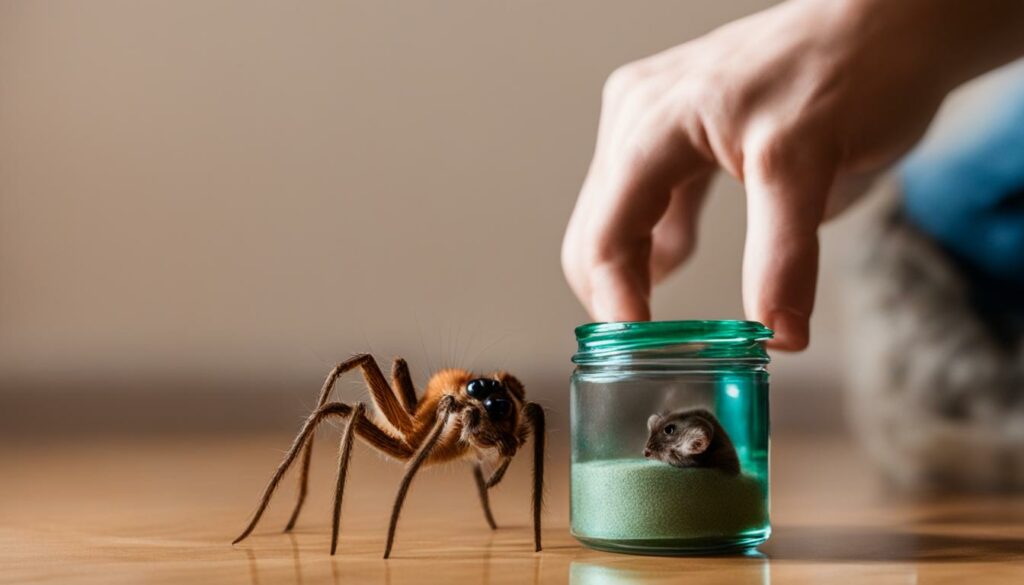
| Hints to Prevent Brown Recluse Spider Bites in Cats | Explanation |
|---|---|
| Keep your home clean and clutter-free | Regularly clean and vacuum areas where spiders may hide, such as storage spaces, closets, and under furniture. |
| Seal cracks and gaps | Prevent spiders from entering your home by sealing any cracks or gaps in walls or windows. |
| Maintain your yard | Keep your yard well-maintained and remove any debris or woodpiles where spiders may reside. |
| Check outdoor resting areas | Regularly inspect sheds, outdoor furniture, and other resting areas to identify and remove spiders. |
Regular monitoring of your cat’s behavior and immediate action can also help prevent brown recluse spider bites. Keep a close eye on your cat’s play areas and discourage them from playing with or eating spiders. If you suspect your cat has been bitten by a brown recluse spider, seek immediate veterinary care. Early intervention can help prevent further complications and ensure your cat receives the necessary treatment.
By following these preventive measures and being vigilant of our cat’s surroundings, we can minimize the risk of brown recluse spider bites and keep our feline friends safe and healthy.
The Danger of Spider Bites Compared to Other Insects
When it comes to the risks posed by insect bites to our feline companions, spiders are often a cause for concern. However, it’s important to note that while some spiders can be venomous to cats, the majority of spider bites are actually harmless. In fact, other insects such as bees, wasps, ants, ticks, and mosquitoes can also pose a risk to cats with their bites or by transmitting diseases.
Spider bites, particularly from venomous species like the brown recluse or black widow, can cause illness and symptoms ranging from mild to severe in cats. These symptoms can include pain, swelling, redness, itchiness, and systemic reactions such as vomiting or trouble breathing. However, it’s crucial to remember that not all spiders are venomous, and the risk of a dangerous reaction to a spider bite is generally low.
In comparison, other insects like bees and wasps can cause immediate pain and allergic reactions in cats. Ticks can transmit diseases such as Lyme disease, while mosquitoes can spread heartworm disease. Each insect has its own set of potential dangers and risks for cats, and it’s essential to be aware of these risks and seek veterinary care if necessary.
By understanding the dangers associated with spider bites and other insect bites, cat owners can take necessary precautions to protect their feline friends. This may include monitoring their environment for spiders, implementing preventative measures such as using flea and tick preventatives, and seeking veterinary care if their cat exhibits any concerning symptoms or reactions.
“While spider bites can cause illness in cats, it’s important to note that the majority of spiders are harmless. Other insects like bees, wasps, ants, ticks, and mosquitoes can also pose a risk to cats with their bites or by transmitting diseases.”
Understanding the Importance of Veterinary Care
When it comes to spider bites in cats, veterinary care is of utmost importance. As pet owners, it is our responsibility to ensure the well-being of our feline companions and provide them with the necessary medical attention when needed. Seeking veterinary care promptly can make a significant difference in the outcome of spider bites in cats, especially those caused by venomous spiders like the brown recluse.
Veterinarians play a vital role in treating spider bites in cats. They have the expertise to properly diagnose the type of spider bite and assess the severity of the symptoms. Through physical examination and medical history assessment, veterinarians can determine the appropriate course of treatment for your cat. They can provide pain management, administer necessary medications, and closely monitor the healing process to ensure the best possible outcome.
Knowing when to seek veterinary care for spider bites in cats is crucial. If you suspect that your cat has been bitten by a venomous spider or if you notice any concerning symptoms such as pain, swelling, or systemic reactions, it is important to contact your veterinarian immediately. Prompt intervention can prevent complications and provide the necessary care to alleviate your cat’s discomfort.
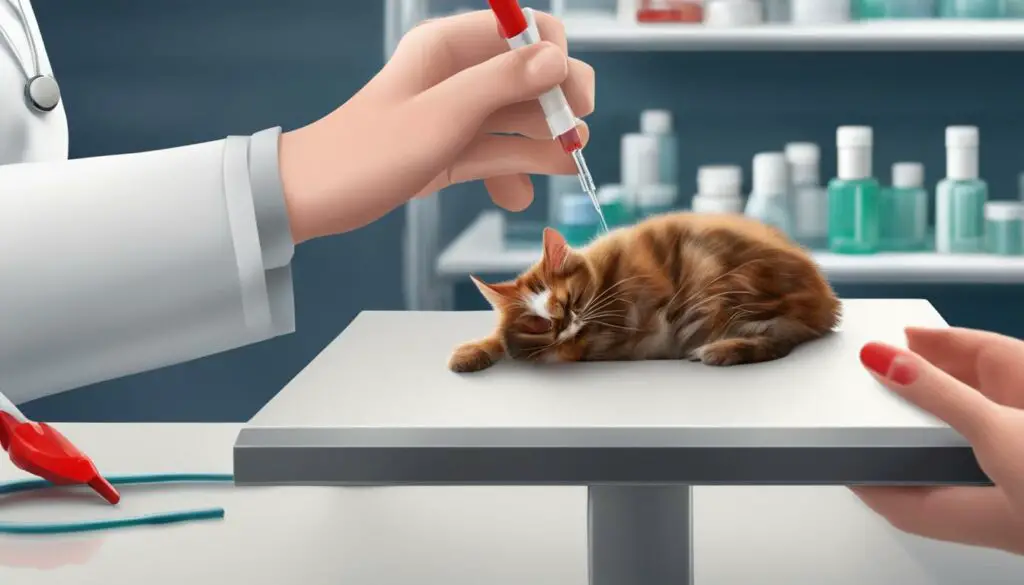
Table: Symptoms that warrant immediate veterinary attention for spider bites in cats
| Symptoms | Action |
|---|---|
| Severe pain | Seek veterinary care immediately |
| Swelling around the mouth or throat | Seek veterinary care immediately |
| Lethargy or weakness | Seek veterinary care immediately |
| Difficulty breathing | Seek veterinary care immediately |
| Unconsciousness | Seek veterinary care immediately |
In conclusion, the importance of veterinary care for spider bites in cats cannot be overstated. Early intervention by a veterinarian can make a significant difference in the outcome of these bites. By seeking prompt medical attention and following the guidance of your veterinarian, you can ensure the best possible care and treatment for your beloved furry friend.
Conclusion
In conclusion, it’s important to be aware of the potential risks if your cat eats a brown recluse spider. While most spiders are harmless to cats, venomous species like the brown recluse can cause illness and even poisoning. It’s crucial to monitor your cat for symptoms such as loss of appetite, lethargy, and swelling around the mouth or throat if they have consumed a venomous spider. Immediate veterinary attention is necessary in these cases.
To keep your cat safe from spider bites, it’s essential to create a safe environment. Remove any spider hiding spots in your home and yard, such as clutter or debris. Regularly engage your cat in exercise and provide interactive toys to redirect their hunting instincts. Additionally, consider using glue traps to catch spiders without chemical pesticides. By taking these preventive measures, you can help minimize the risk of spider bites for your feline friend.
If you suspect your cat has been bitten by a spider, it’s important to seek veterinary care. Symptoms of spider bites can vary depending on the species and severity of the bite. Veterinarians can provide the necessary treatment, including pain relief, anti-inflammatories, and monitoring the healing process. Remember, early intervention is key to ensure the best possible outcome for your cat.
FAQ
What happens if a cat eats a spider?
In most cases, eating a spider will not cause harm to your cat. However, if your cat eats a venomous spider, there is a risk of illness or poisoning that requires immediate veterinary attention.
Are spiders harmful to cats?
While most spiders are harmless to cats, some venomous species, such as the brown recluse or black widow, can cause severe illness if bitten or consumed.
What happens if my cat eats a brown recluse spider?
Consuming a brown recluse spider can lead to severe illness in cats. Symptoms to watch for include loss of appetite, lethargy, fever, drooling, or swelling around the mouth or throat. Immediate veterinary attention is necessary if you suspect your cat has eaten a brown recluse spider.
What are the symptoms of spider bites in cats?
Common symptoms of spider bites in cats include pain, swelling, redness, and itchiness at the bite site. Cats may also exhibit signs of illness such as loss of appetite, lethargy, fever, drooling, or swelling around the mouth or throat. In severe cases, systemic reactions can occur.
How are spider bites in cats treated?
Treatment for spider bites in cats depends on the severity of symptoms and the type of spider responsible for the bite. Supportive care, including pain relief, anti-inflammatories, and fluid therapy, is often provided. In severe cases, surgical intervention or antivenom may be necessary.
How can I prevent my cat from eating spiders?
To prevent cats from eating spiders, it’s important to create a safe environment. Remove spider hiding spots, keep your yard clean, and consider using glue traps. Engage your cat in regular exercise and provide interactive toys to redirect their hunting instincts.
How can I identify a brown recluse spider?
Brown recluse spiders have a unique violin-shaped mark on their backs and range in color from tan to dark brown. They have six eyes arranged in a semicircular pattern. Correct identification is important to determine if it is a brown recluse or a harmless species.
How are brown recluse spider bites diagnosed in cats?
Diagnosing brown recluse spider bites in cats is based on medical history, symptoms, and geographical location. Your veterinarian may perform a physical examination and order bloodwork. If the suspected spider can be collected, it may assist in identification.
What is the treatment for brown recluse spider bites in cats?
Treatment for brown recluse spider bites in cats focuses on supportive care, pain management, antibiotics to prevent secondary infection, and monitoring the wound for signs of healing or necrosis. Severe cases may require intravenous fluids and other medications to address systemic signs.
How can I prevent brown recluse spider bites in cats?
To prevent brown recluse spider bites in cats, reduce hiding spots for spiders, keep areas clean, and consult with an exterminator if necessary. Glue traps can be used to catch spiders, and monitoring your cat’s behavior and environment is important.
How do spider bites compare to other insect bites in cats?
Spider bites can cause illness in cats, but other insects like bees, wasps, ants, ticks, and mosquitoes can also pose a risk with their bites or by transmitting diseases. Each insect has its own potential dangers and reactions in cats.
Why is veterinary care important for spider bites in cats?
Veterinary care is crucial when dealing with spider bites in cats. Veterinarians can properly diagnose the type of spider bite and provide appropriate treatment. They can manage pain, administer necessary medications, and monitor the healing process to ensure the best possible outcome for your cat.
Source Links
- https://cooperpetcare.com/my-cat-ate-a-spider/
- https://www.hepper.com/my-cat-ate-a-spider-vet-answer/
- https://www.petmd.com/cat/poisoning/brown-recluse-spider-bite-poisoning-cats

